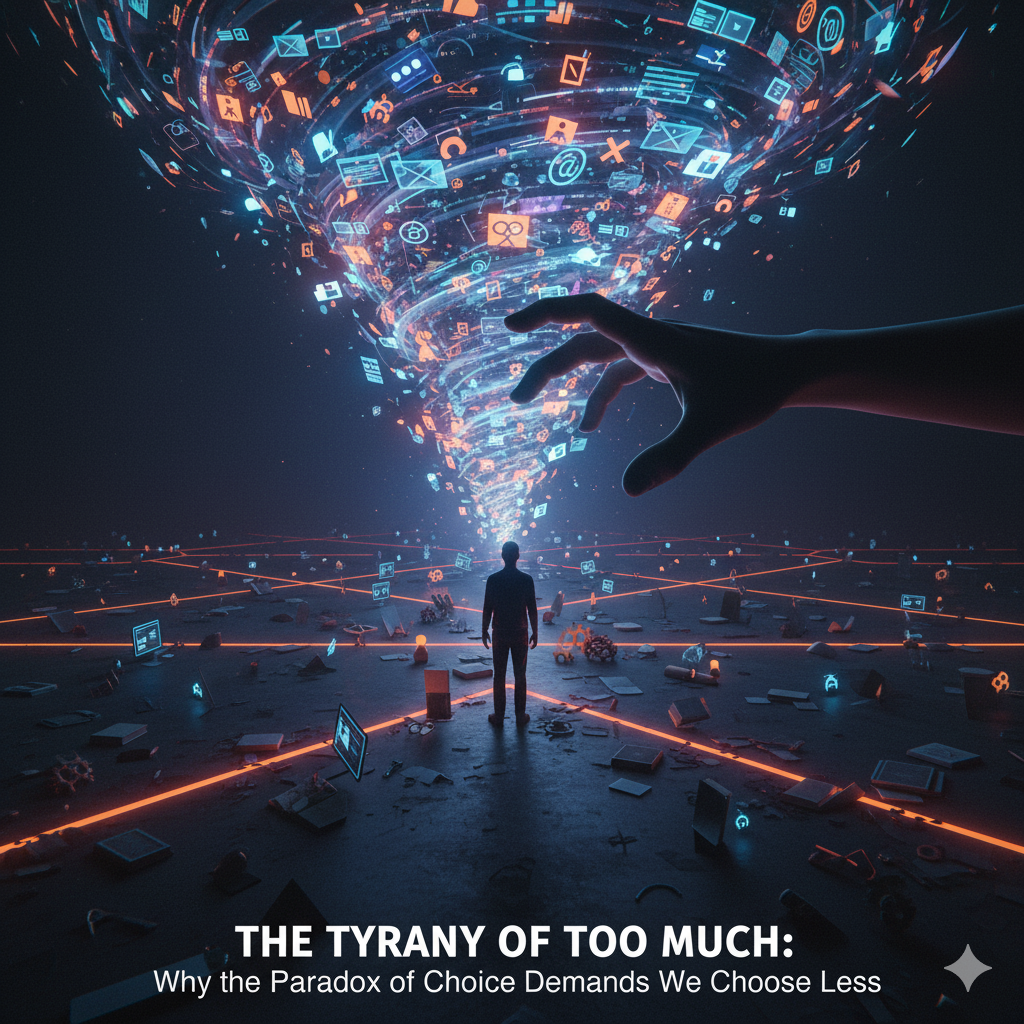We live in an age of unprecedented abundance. From the endless scroll of streaming services to the thousands of products lining grocery store shelves, the modern consumer is presented with a dizzying array of options for nearly every decision. Conventional wisdom suggests that more choice equals more freedom, and more freedom equals greater happiness. Yet, a growing body of psychological research reveals a counterintuitive truth: too much choice can be paralyzing, exhausting, and ultimately, deeply unsatisfying.This phenomenon is known as the Paradox of Choice.
What is the Paradox of Choice?
The term was popularized by psychologist Barry Schwartz in his 2004 book, The Paradox of Choice: Why More Is Less [1]. The paradox states that while some choice is undoubtedly good and essential for well-being, an excessive number of options can lead to negative psychological consequences [2]. Instead of feeling liberated, we feel burdened.Schwartz argues that as the number of choices increases, the mental effort required to evaluate them grows exponentially. This leads to three primary negative effects that undermine our satisfaction:
1. Decision Paralysis
When faced with an overwhelming number of options, we often become unable to make a decision at all. The fear of making the wrong choice—of missing out on the perfect option—causes us to freeze.
Example: Consider the simple act of choosing a movie on a streaming platform. With thousands of titles available, many people spend more time scrolling through categories and reading synopses than actually watching a film. The sheer volume of content leads to a state of choice overload, where the decision-making process is abandoned entirely [3].
2. Decision Fatigue and Lower Quality Choices
Every choice, no matter how small, depletes our finite mental energy. This is known as decision fatigue [4]. When we are forced to make countless trivial decisions throughout the day (which coffee to buy, which email to answer first, which route to take), our ability to make sound, high-quality decisions later in the day suffers.
Example: A classic study illustrating this is the “jam experiment” [5]. Researchers set up a tasting booth with two conditions: one with 24 varieties of gourmet jam and one with only 6. While the table with 24 jams attracted more initial interest, the table with only 6 jams resulted in significantly more purchases. The extensive choice paralyzed the shoppers, while the limited choice made the decision manageable and led to action.
3. Increased Regret and Lower Satisfaction
Perhaps the most insidious effect of the paradox is the feeling of regret and the resulting decrease in satisfaction with the choice we do make. When there are only a few options, it is easy to justify your selection. When there are hundreds, it is impossible not to wonder if one of the unchosen options would have been better [6].
This constant comparison raises our expectations for the outcome of our choice. If the chosen option is anything less than perfect, we blame ourselves for not having chosen more wisely from the vast available pool, leading to post-decision regret and a sense of disappointment [7].
The Necessity of Reducing Your Options
The solution to the Paradox of Choice is not to eliminate choice entirely, but to strategically and intentionally reduce the number of options we consider.For instance, in your wardrobe, instead of facing hundreds of clothing items and daily decision fatigue, you can adopt a capsule wardrobe or a uniform (like Steve Jobs or Mark Zuckerberg), limiting choices to a few high-quality, interchangeable items. For finances, rather than researching dozens of investment funds, you can automate savings and investments into a few pre-selected, low-cost index funds, removing the need for constant monitoring and decision-making. When it comes to diet, you can eliminate the daily “what’s for dinner?” decision by meal prepping or establishing a few go-to, healthy meals for the week. Finally, with technology, instead of constantly researching the newest phone or gadget, adopt a “good enough” philosophy: buy a reliable product that meets 80% of your needs and stop researching alternatives once the purchase is made [8].By consciously setting boundaries and limiting the field of consideration, we shift from being maximizers (those who seek the absolute best option, leading to endless research and regret) to satisficers (those who seek an option that is “good enough,” leading to quicker decisions and higher overall happiness) [9].
In a world that constantly pushes us toward more, the most powerful act of self-care and productivity is often to deliberately choose less. By reducing our options, we free up mental energy for the decisions that truly matter, leading to greater satisfaction and a profound sense of control over our lives.
References
[1] Schwartz, B. (2004). The Paradox of Choice: Why More Is Less. Harper Perennial.
[2] The Decision Lab. The Paradox of Choice. https://thedecisionlab.com/reference-guide/economics/the-paradox-of-choice
[3] Psychology Today. Choice Overload: ‘I Can’t Decide!’. https://www.psychologytoday.com/us/blog/putting-psychology-into-practice/202307/choice-overload-i-cant-decide
[4] Valley Oaks Health. Understanding Decision Fatigue: How Too Many Choices…. https://www.valleyoaks.org/health-hub/understanding-decision-fatigue/
[5] Iyengar, S. S., & Lepper, M. R. (2000). When choice is demotivating: Can one desire too much of a good thing? Journal of Personality and Social Psychology, 79(6), 995–1006.
[6] Model Thinkers. Paradox of Choice. https://modelthinkers.com/mental-model/paradox-of-choice
[7] Leiden Psychology Blog. Paradox of Choice. https://www.leidenpsychologyblog.nl/articles/paradox-of-choice
[8] ProTrainings. The Power of No Choice: How Fewer Options Lead to…. https://www.protrainings.com/blog/power-no-choice-fewer-options-better-decisions/
[9] Psychology Today. Breaking Free From Indecision. https://www.psychologytoday.com/us/blog/the-pleasure-is-all-yours/202511/breaking-free-from-indecision

